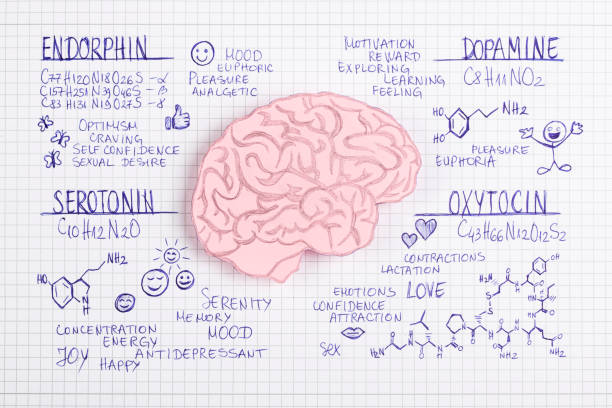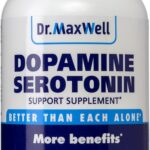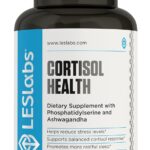6 Hormones That Govern Our Joy: Decoding the Chemistry of Happiness
6 Hormones That Govern Our Joy, Decoding the Chemistry of Happiness, Happiness hormones, Serotonin, Dopamine, Oxytocin, Endorphins, Norepinephrine and Cortisol, How to increase happiness, Tips for happiness, Mental health, Well-being

Introduction
6 Hormones that govern our joy, happiness, and the elusive state of joy and contentment have been the subject of philosophical and scientific inquiry for centuries. While the pursuit of happiness is as universal as humanity itself, the factors that contribute to this coveted state remain a complex puzzle.
Recent advancements in neuroscience have shed light on the biological underpinnings of happiness, revealing the crucial role played by 6 hormones that govern our joy: serotonin, dopamine, oxytocin, endorphins, norepinephrine and Cortisol. These chemical messengers work in concert to regulate our moods, behaviours, and overall sense of well-being.
1 . Serotonin: The Mood Elevator https://amzn.to/468dsH9
https://amzn.to/468dsH9


Serotonin, often dubbed the “happy hormone,” plays a pivotal role in regulating our mood, sleep, appetite, and digestive processes. This neurotransmitter is synthesized in the brain’s raphe nuclei and is released in response to various stimuli, including sunlight, exercise, and certain foods.
Adequate levels of serotonin are essential for maintaining a positive mood and fostering feelings of calmness and well-being. When serotonin levels are low, we may experience symptoms of depression, anxiety, irritability, and difficulty sleeping.
2 . Dopamine: The Reward Systemhttps://amzn.to/46ePYjE


Dopamine, another crucial player in the happiness orchestra, is often associated with pleasure, motivation, and reward. This neurotransmitter is released in response to stimuli we perceive as pleasurable, such as eating delicious food, engaging in enjoyable activities, or achieving a desired goal.
Dopamine plays a central role in our brain’s reward system, reinforcing behaviours that lead to positive outcomes. By anticipating and receiving rewards, we are motivated to engage in activities that contribute to our overall well-being.
3 . Oxytocin: The Love Hormone https://a.co/d/b4KS0Ei

Oxytocin: Often called the “love hormone,” oxytocin is essential for childbirth, breastfeeding, and strong parent-child bonding. It can also help promote trust, empathy, and bonding in relationships. Levels generally increase with physical affection

Oxytocin, often dubbed the “love hormone,” is a neuropeptide that promotes feelings of love, trust, bonding, and social connection. This hormone is released in response to physical touch, such as hugging, cuddling, and massage.
Oxytocin plays a critical role in strengthening social bonds and fostering empathy. It also contributes to feelings of relaxation and stress reduction, further enhancing our overall well-being.
4 . Endorphins: The Natural Painkillers https://amzn.to/3MFNHXI




Endorphins, the body’s natural painkillers, are produced in response to physical activity, pain, and stress. These hormones bind to opioid receptors in the brain, producing analgesic and euphoric effects.
Endorphins are responsible for the “runner’s high,” a feeling of euphoria experienced after prolonged exercise. They also contribute to feelings of relaxation and stress reduction, enhancing our overall well-being.
5 . Norepinephrine https://a.co/d/05eiEZb
 Role in Mood Regulation: Norepinephrine is a neurotransmitter and a hormone that acts as a chemical messenger in the brain and throughout the body. It is associated with the “fight or flight” response, alertness, and arousal. Norepinephrine plays a crucial role in regulating mood by influencing attention, focus, and emotional responsiveness.
Role in Mood Regulation: Norepinephrine is a neurotransmitter and a hormone that acts as a chemical messenger in the brain and throughout the body. It is associated with the “fight or flight” response, alertness, and arousal. Norepinephrine plays a crucial role in regulating mood by influencing attention, focus, and emotional responsiveness.- Stress Response: During stressful situations, the release of norepinephrine increases, preparing the body to respond to a perceived threat. This can lead to heightened awareness, increased heart rate, and a temporary boost in energy. However, persistent or excessive levels of norepinephrine can contribute to feelings of anxiety and restlessness.
- Impact on Mental Health: Imbalances in norepinephrine levels have been linked to mood disorders such as depression and bipolar disorder. In depression, for example, there may be a deficiency of norepinephrine, and medications that increase its availability in the brain are often used as part of treatment.
6 . Cortisol https://amzn.to/464AXkx
- Role in Stress Response: Cortisol, often referred to as the “stress hormone,” is produced by the adrenal glands in response to stress. Its primary function is to mobilize energy stores and enhance the body’s ability to respond to a stressor. In the short term, cortisol is essential for survival by preparing the body to face challenges.

Cortisol 
- Regulation of Mood and Emotions: Cortisol also interacts with the brain regions involved in mood regulation. While acute increases in cortisol during stressful situations are adaptive, chronic elevation, as seen in prolonged stress, can negatively impact mood. High and sustained levels of cortisol have been associated with symptoms of anxiety and depression.
- Sleep-Wake Cycle: Cortisol follows a diurnal rhythm, with higher levels in the morning to help wake the body and lower levels in the evening to facilitate sleep. Disruptions in this natural rhythm, such as elevated cortisol levels at night, can contribute to sleep disturbances, affecting mood and overall well-being.
- Immune System Regulation: Cortisol also has anti-inflammatory properties and helps regulate the immune system. Chronic stress and consistently elevated cortisol levels can suppress the immune response, leading to increased susceptibility to illness.
- Impact on Mental Health: Similar to norepinephrine, dysregulation of cortisol has been implicated in mood disorders. Individuals with conditions like major depressive disorder and chronic stress often exhibit altered cortisol patterns.
In summary, both norepinephrine and cortisol are integral to the body’s stress response and mood regulation. While their acute actions are adaptive, chronic imbalances or dysregulation can contribute to mood disorders and impact overall mental health. A balanced and healthy lifestyle, including stress management techniques, adequate sleep, and regular exercise, can contribute to the optimal functioning of these hormonal systems.
5 . Activities That Propel Happiness
Incorporating activities that stimulate feel-good hormones into your daily routine is a personalized journey. While there’s no one-size-fits-all approach, Mr Pakistan recommends a curated selection of activities to elevate your happiness quotient:
- Cuddling with a Loved One: Bask in the warmth of human connection by indulging in the simple yet profound act of cuddling with a loved one.
- Exercise: A Symphony of Joyful Movements: Unlock the floodgates of endorphins through cardiovascular exercise, embracing the liberating sensation of a “runner’s high. Exercise not only boosts endorphin production but also releases serotonin and dopamine, contributing to mood elevation and stress reduction.
- Prioritize Sleep: Adequate sleep is essential for regulating hormones, particularly serotonin and melatonin, which play a crucial role in mood regulation.
- Maintain a Healthy Diet: A diet rich in fruits, vegetables, and whole grains provides the nutrients necessary for optimal hormone production.
- Practice Mindfulness and Meditation: Mindfulness techniques and meditation practices can effectively reduce stress and anxiety, promoting the release of serotonin and oxytocin.

Meditation - Cultivate Positive Relationships: Strong social connections and meaningful interactions trigger oxytocin release, enhancing feelings of love, belonging, and happiness.
- Seek Professional Help When Needed: If you’re experiencing persistent low mood or difficulty regulating emotions, seeking professional help from a therapist can provide valuable guidance and support.
- Aromatherapy: Elevating the Senses: Experiment with aromatherapy, immersing yourself in scents that transport you to a realm of tranquillity and delight.

 https://a.co/d/3WIMhHJ
https://a.co/d/3WIMhHJ - Massage: A Blissful Escape: Treat yourself to the therapeutic wonders of a massage, triggering a cascade of relaxation and feel-good sensations.

Vagus Nerve Massage Techniques 
Neck and Throat Massage - Intimacy: The Power of Connection: Explore the diverse facets of intimacy, from holding hands to cuddling, kissing, and engaging in meaningful sexual experiences.
- Music: The Melody of Joy: Immerse yourself in the enchanting world of feel-good music, allowing melodies to uplift your spirits and evoke positive emotions.
- Nature: A Healing Haven: Reconnect with the great outdoors, embracing the rejuvenating effects of spending time surrounded by nature’s beauty.

Nature. A group of happy children boys and girls run in the Park on the grass on a Sunny summer day. The concept of ethnic friendship, peace, kindness, childhood. - Nap: The Power of Rest: Harness the revitalizing benefits of a nap, allowing your body and mind to recharge and reset.

- Comedy: Laughter as Medicine: Indulge in the therapeutic laughter brought on by comedy, a powerful antidote to stress and a booster of happiness.

FAQs
Q I. Are there other hormones that contribute to happiness?
A . Yes, while dopamine, serotonin, oxytocin, and endorphins play primary roles in regulating happiness, other hormones, such as norepinephrine and cortisol, also influence mood and well-being.
Q 2. How can I increase my hormone levels naturally?
A . In addition to the lifestyle strategies mentioned above, incorporating activities like yoga, spending time in nature, and listening to music can further enhance hormone production and promote happiness.
Q 3. What are some signs of hormone imbalances that may affect happiness?
A . Symptoms like persistent low mood, irritability, fatigue, sleep disturbances, and changes in appetite or sex drive may indicate hormone imbalances that could be affecting happiness.
Q 4: What are some of the signs of low-happiness hormones?
A: Some of the signs of low happiness hormones include:
- Depressed mood
- Anxiety
- Irritability
- Fatigue
- Loss of appetite
- Sleep problems
- Loss of interest in activities that you used to enjoy
If you are experiencing any of these symptoms, it is important to talk to your doctor. They can help you determine if there is an underlying medical condition that is causing your symptoms and recommend appropriate treatment.
Q 5. What are the best ways to boost my happiness hormones?
A: Numerous lifestyle factors can positively impact your happiness hormones. Here are a few suggestions:
- Engage in regular exercise: Physical activity not only promotes the release of endorphins but also contributes to overall well-being by reducing stress, improving sleep, and boosting self-esteem.
- Prioritize quality sleep: Adequate sleep is essential for regulating serotonin levels and enhancing cognitive function. Aim for 7-8 hours of quality sleep each night.
- Cultivate meaningful connections: Social interaction triggers the release of oxytocin, promoting feelings of love, bonding, and trust. Nurture your relationships with family, friends, and loved ones.
- Engage in activities you enjoy: Activities that bring you joy stimulate the release of dopamine, reinforcing positive behaviours. Make time for hobbies, passions,
Conclusion
Happiness, while seemingly elusive, is deeply rooted in the intricate workings of our brains. The six happiness hormones – serotonin, dopamine, oxytocin, endorphins, norepinephrine and cortisol – play a symphony of roles in orchestrating our moods, behaviours, and overall sense of well-being.
By understanding the science behind happiness, we can empower ourselves to cultivate greater joy and contentment in our lives. By engaging in activities that promote the release of these happiness hormones, we can nurture our mental and emotional well-being, fostering a life filled with vitality and fulfilment.
Disclaimer: The contents of this article are intended to raise awareness about common health issues and should not be viewed as sound medical advice for your specific condition. You should always consult with a licensed medical practitioner before following any suggestions outlined in this article or adopting any treatment protocol based on the article’s contents.
Top 15 High Protein Vegan Recipes: No More Eating a Chicken a Day